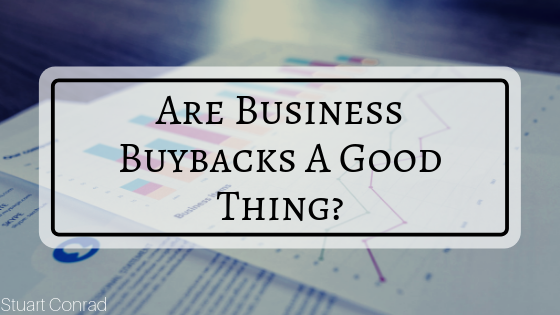The Tax Cuts and Jobs Act (TCJA) that was passed in 2017 provided a major reduction in the tax rate for the majority of individuals. It also was a significant reduction in the tax rates for corporate profits. The reduction in corporate tax rates provided the opportunity for corporations to direct some of the money saved into the pockets of employees as companies that paid less in taxes could pay more in wages. Some businesses gave nice bonuses to their employees as a result of the tax cuts. In addition, many corporations decided to use the tax savings to buy back shares of their publicly traded stock. Are these share buybacks good for businesses or the economy?
Higher Share Prices
One of the biggest benefits that can come with share buybacks is a higher price for the company’s stock. The upward pressure on the stock can be attributed to simple supply and demand as there is a new large buyer of stock in the marketplace driving up the share price. However, there is also the fundamental aspects of increasing the underlying value of the remaining shares in the marketplace as the number of outstanding shares decreases. One way to look at this scenario is to look at the company’s earnings per share. For example, a company that made $1 million in a given quarter would have an earnings per share (EPS) number of $1.00 if it had 1 million shares outstanding. If the company decided to buy back half of the outstanding shares and maintained the same net income, its earnings per share would rise to $2.00. The higher earnings per share should make the stock more attractive from a value perspective and relative to other publicly traded companies.
Tax Considerations
Warren Buffett is a big fan of receiving dividends, but he’s a bigger fan of share buybacks. Dividends create a taxable event every time a company decides to pay them out. Share buybacks are not directly taxable. They are a use of capital that does not create a taxable event, and they allow shareholders to decide when to pay taxes on capital gains. Additionally, share buybacks can cut dividend payments. With fewer shares outstanding, there will be fewer shares that require a dividend payment. A 10% reduction in the number of shares on the market would lead to a 10% cut in the overall dividend payout as long as a dividend increase does not accompany the buyback.
Deferred Investment
One of the drawbacks of share buybacks is the fact that the money used on buybacks is money that cannot be used for capital investment. Basically, every dollar that is used on a buyback is a dollar that cannot go toward growing the company. This can provide a negative impact on the overall growth of the company and the economy as a whole.
Buybacks come with both benefits and drawbacks. Shareholders of the company are most likely to benefit from a share buyback. They will generally see higher share prices and higher total returns. The overall economy and employees might not see as big of a benefit because dollars spent on buybacks cannot be spent on raises or capital improvements.
